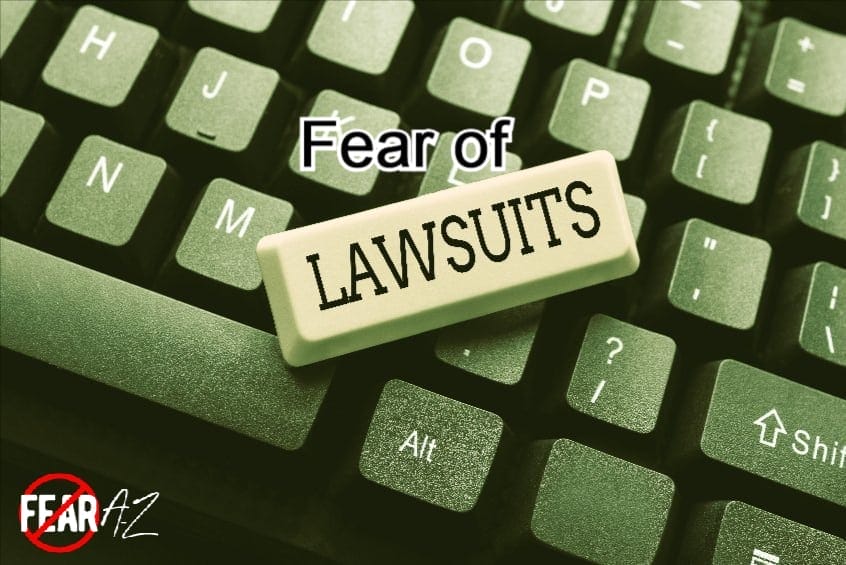Share This Article
Are You Afraid of Litigious Actions?
Have you ever come across a courtroom drama while browsing through TV channels and felt yourself overcome with anxiety? Do you carry a camera or a camera-equipped phone with you all at all times to capture “evidence”? Are you hyper-aware of your surroundings and make sure you don’t make any wrong moves, however small, that may land you inside a courtroom?
If so, you may be suffering from liticaphobia, also known as the fear of lawsuits.
It must be difficult for you to explain to your loved ones why you are so cautious and avoid making the smallest mistakes. You may fear that others may mock you. However, with the increasing number of lawsuits occurring each day, you’re not alone. There is a long list of phobias that people suffer from, of which liticaphobia is a fairly common one.
However, with proper guidance and therapy, you can manage your fear of lawsuits and live a healthy, happy life. Read on to learn how.

What Is Liticaphobia?
Liticaphobia is the fear of lawsuits or the fear of courtrooms. A person suffering from this phobia has an irrational fear that s/he may face a lawsuit. The person may also fear that they will have to face jail time and may not be able to mount a defense.
People suffering from liticaphobia are extra cautious with their everyday decisions because they don’t want to upset anyone or instigate a lawsuit. They may find themselves in a constant state of worry and anguish.
Liticaphobia, meaning fear of courtrooms phobia, may leave one trembling at the thought of facing a lawsuit, not having money for bail, or having to face jail time. The fear may even exacerbate to the extent of causing panic attacks.
Thankfully, like all phobias, liticaphobia can be managed with the right treatments.
Similar Extreme Fear & Phobia: Fear of Justice
Liticaphobia Causes
While the liticaphobia definition is clear, the exact cause is yet to be known. However, there are several speculations. Genetics are considered a major contributing factor. There is a higher risk of an individual developing liticaphobia if they have a history of mental illness in the family.
There is also a greater risk if a family member or someone close is suffering from liticaphobia or any other phobia. For example, if you know someone who is suffering from liticaphobia, they may already have verbally shared their anxieties with you. They may have talked about the excessive number of people facing lawsuits, those who are incarcerated but innocent, or those who have to spend a fortune to get acquitted, etc. This may cause you to develop a thought process along the same line and result in anxiety and fear related to courtrooms and litigation.
Another cause of liticaphobia may be watching too many courtroom dramas. One may become paranoid and be constantly worried about being sued.
Childhood experiences can also lead to the development of this phobia. For example, if a person watches their parent, relative, or neighbor go through a devastating lawsuit, it may lead to them develop a strong fear of lawsuits.
Liticaphobia Symptoms
Symptoms of liticaphobia vary from one individual to another and largely depend upon the severity of the disease. Following are some common symptoms of liticaphobia.
Physical Symptoms:
- Sweating
- Trembling
- Hyperventilation
- Increased heartbeat
- Increased blood pressure
- Dry mouth
- Dizziness
- Nausea
- Numbness
- Headaches
Physiological Symptoms:
- Fear of being in court
- Fear of facing a lawyer
- Fear and anxiety
- Fear of helplessness
- Confusion
- Feeling disconnected
Liticaphobia Treatment
Phobias are irrational perceptions of reality, so helping the patient realize that their fear is irrational is the key to treating any phobia.
With liticaphobia, people suffering from the phobia are typically law-abiding citizens who have nothing to worry about. So, helping these patients realize that their fear is irrational and that they face no real threat from the law may address their phobia.
Here are some effective ways to treat liticaphobia.
Self-Help
Self-help is the best and least intrusive way to get over any fear. This includes activities that help reduce fear and anxiety, such as yoga, meditation, and practicing mindfulness. You may even want to consider self-help groups because they’ll give you an outlet to share your fears with others who may be undergoing the same experiences.
Journaling and talking to your loved ones or someone you trust is also excellent for expressing your fears and thoughts. Consistently practicing these techniques can go a long way in helping alleviate the symptoms of liticaphobia.
Professional Therapy
Therapy, or talking therapy, is the most effective way of treating any phobia. There are many types of therapies that can help patients face their fears and work on ways to deal with them.
Cognitive Behavioral Therapy (CBT)
Cognitive behavioral therapy, or CBT, works on the principle that our reactions or behaviors are influenced by our thoughts and emotions. So, how we perceive a situation directly affects how we react. CBT helps patients change their perceptions to align with reality and finds solutions to dealing with the phobia.
A therapist trained with CBT will help the patient alter his/her thought process so the negative thoughts are replaced by rational, positive ones.
Exposure Therapy
Exposure therapy is becoming one of the most widely used therapies for treating phobias. It involves gradually exposing the patient to the object of their fear in a controlled environment in the presence of a professional therapist.
In the case of liticaphobia, the patient may first be asked to visualize or imagine being in a courtroom or dealing with lawsuits. Eventually, as the patient gradually overcomes their anxiety and other symptoms, they may be exposed to real-life situations.
Learning to Cope with Liticaphobia
Liticaphobia can hinder various aspects of one’s life. It can cause the person to overthink and obsessively assess all their actions so that they do not face a lawsuit. This can result in the person limiting themselves to their homes and avoiding socializing.
However, with self-help and consistent treatments, the patient can overcome their fear of lawsuits or the courtroom and live a healthy life.
In Conclusion
Living with any phobia is not easy. And with liticaphobia, or fear of courtrooms, the person suffering from it can find their day-to-day life being limited. It can cause them to worry about irrational things.
Thankfully, with loving support and proper treatment, you can overcome your fear of lawsuits and live a fulfilling life. Who knows? Soon enough, you might find yourself enjoying courtroom dramas!




